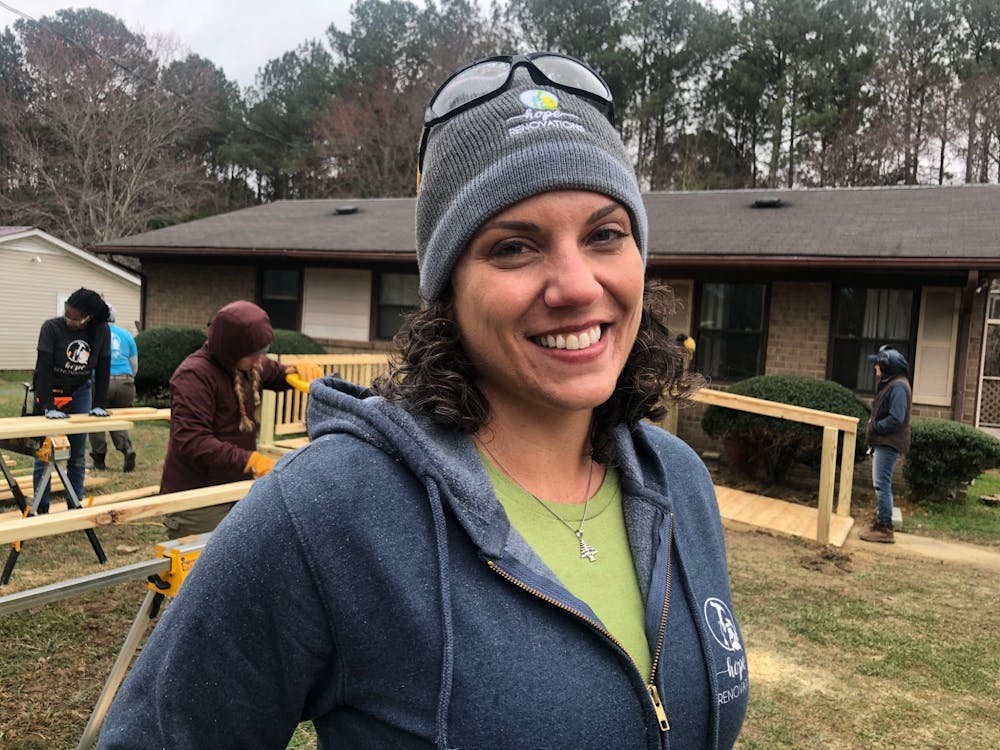As of 2021, women make up 11 percent of the construction workforce, but most women in the field are involved in office and administration support.
Hope Renovations gives women and gender minorities the opportunity to take part in hands-on, pre-apprenticeship programs. In addition, participants repair and renovate the homes of older adults and people with disabilities in the community to make it easier and safer for them to age in place.
Kat Reach, the director of construction operations at Hope Renovations, had her first formal job in commercial building when she was an undergraduate in college.
“I was the only woman on site, period — with the exception of maybe a designer or two,” she said.
During the two years she worked as a builder, she said she experienced microaggressions and some explicit harassment.
Now, being a part of a team of mostly female and gender-expansive people who understand and are actively fighting against what she went through has lessened the impact of her previous negative experiences, she said.
Spencer added that supporting non-binary people who want to work in construction and have lived experience as women is an important aspect of Hope Renovations’ mission.
“We really recognize this has to be a program that has to be open to women and gender minorities because that’s the role that we can play — helping them get a foothold in an industry where they’ve never had a seat at the table,” she said.
The Hope Renovations team hopes to support people in their community, as well as change the industry as a whole, Reach said.
“When I do come across someone with a very narrow-minded belief or someone who maybe does something offensive, being able to step back and recognize that we’re all victims of the culture that has perpetuated those beliefs and less frustration at the individual in front of me,” she said.
A similar organization in Charlotte, She Built This City, provides educational programming for girls as young as 7 years old in addition to pre-apprenticeship training programs for women.
Marion Pulse, the resource development manager for She Built This City, said the organization hopes to increase the likelihood of young girls choosing to go into construction by providing information and resources.
To get the day's news and headlines in your inbox each morning, sign up for our email newsletters.
“Yes, women are breaking into what they say are non-traditional industries for women, and these male-dominated spaces, but some industries are just at a slower rate than others,” she said.
In 2021, construction companies had a labor shortage of 430,000 workers, according to a press release from Associated Builders and Contractors. One of the reasons for this shortage, according to Reach, is that high schoolers are urged to go to college instead of the trades, even if they have a natural ability for construction and contracting.
By having a more broadened group of people interested in the trade, there will be less stigma about who is well-equipped to go into construction, Reach said.
She said she has wondered if she would have had less student loans if she had seen a path in construction at a younger age or had less internalized feelings about the trades.
“I think in a lot of ways we’re socialized to not have that confidence that we can do those things,” Reach said.
According to Spencer, bringing people who are being excluded into construction will not only help the industry be more inclusive, it will also help open up the general public’s perceptions of working in the trades.
“There’s so much honor in being a person that creates a space for people,” she said.
@eliza_benbow
@DTHCityState | city@dailytarheel.com
Eliza BenbowEliza Benbow is the 2023-24 lifestyle editor at The Daily Tar Heel. She has previously served as summer university editor. Eliza is a junior pursuing a double major in journalism and media and creative writing, with a minor in Hispanic studies.



